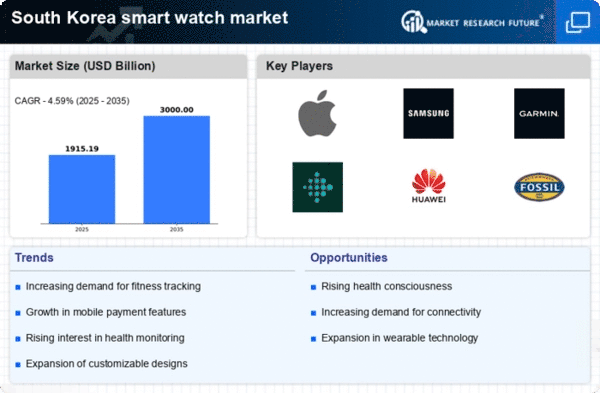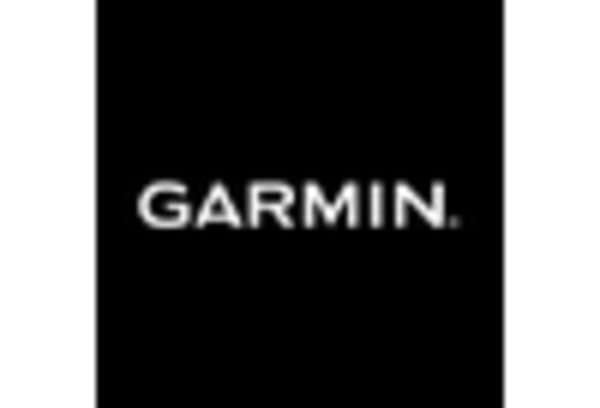Increased Smartphone Penetration
The proliferation of smartphones in South Korea has a direct correlation with the growth of the smart watch market. As smartphone penetration reaches approximately 95% in 2025, consumers are more inclined to purchase smart watches that seamlessly integrate with their mobile devices. This integration allows for enhanced functionalities, such as notifications, calls, and app usage directly from the wrist. The convenience offered by smart watches, coupled with the high smartphone adoption rate, suggests a promising future for the smart watch market. Manufacturers are likely to capitalize on this trend by developing smart watches that offer unique features tailored to smartphone users.
Rising Health Awareness Among Consumers
In South Korea, there is a notable increase in health awareness among consumers, which significantly impacts the smart watch market. With a growing emphasis on fitness and wellness, individuals are increasingly seeking devices that can assist in tracking their health metrics. Reports indicate that around 60% of consumers consider health tracking features as a primary factor when purchasing a smart watch. This heightened focus on personal health management is likely to drive sales, as smart watches equipped with fitness tracking capabilities become essential tools for maintaining a healthy lifestyle. Consequently, this trend is expected to bolster the smart watch market in the coming years.
Technological Advancements in Wearable Devices
The smart watch market in South Korea is experiencing a surge due to rapid technological advancements in wearable devices. Innovations such as improved sensors, enhanced battery life, and advanced health monitoring capabilities are driving consumer interest. For instance, the integration of ECG and blood oxygen monitoring features has become increasingly prevalent, appealing to health-conscious consumers. As of 2025, the market is projected to grow at a CAGR of approximately 15%, indicating a robust demand for technologically advanced smart watches. This trend suggests that manufacturers are likely to invest heavily in research and development to stay competitive, thereby further propelling the smart watch market.
Growing Demand for Enhanced Connectivity Features
The smart watch market in South Korea is witnessing a growing demand for enhanced connectivity features. As consumers seek devices that offer seamless connectivity with other smart devices, the importance of features such as LTE connectivity and Bluetooth capabilities becomes evident. This trend is particularly relevant as more individuals adopt smart home technologies, creating a need for smart watches that can control various devices. In 2025, it is projected that smart watches with advanced connectivity features will capture a significant share of the market, potentially exceeding 30%. This indicates that manufacturers must focus on developing smart watches that cater to the evolving connectivity needs of consumers.
Evolving Consumer Preferences for Fashionable Wearables
Consumer preferences in South Korea are shifting towards fashionable wearables, which is influencing the smart watch market. As consumers increasingly view smart watches as fashion accessories, manufacturers are responding by offering a diverse range of designs, colors, and materials. This trend indicates that aesthetics play a crucial role in purchasing decisions, with many consumers willing to pay a premium for stylish options. In 2025, it is estimated that the demand for fashionable smart watches will account for nearly 40% of total sales in the market. This evolution in consumer preferences suggests that brands must prioritize design alongside functionality to remain competitive.















